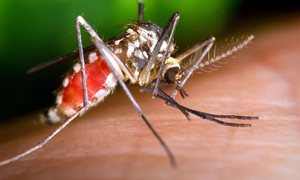
Study in Uganda highlights the potential for school-aged children to be targeted for malaria control interventions. The role of people infected with malaria without showing symptoms presents a hidden risk to efforts to control the disease after they were found to be responsible for most infections in mosquitoes, according to a study published in The Lancet Infectious Diseases.
Researchers from the Infectious Diseases Research Collaboration (IDRC), London School of Hygiene & Tropical Medicine (LSHTM), Radboud university medical center and University of California, San Francisco, found asymptomatic children in the Uganda study were the biggest source of malaria parasites transmitted to mosquitoes. This could provide a new opportunity for control efforts by targeting this infectious reservoir.
Malaria presents a major health threat globally, with 94% of cases on the African continent alone, according to the WHO World Malaria Report 2020. The disease is passed to a human through the bite of an infected female Anopheles mosquito causing infection with the parasite. The predominant and most deadly parasite, Plasmodium falciparum, accounts for over 75% of mortality worldwide and is highly prevalent in Uganda.
Malarial parasites depend on a life cycle in which they constantly move back and forth between humans and mosquitoes. Successfully interrupting transmission of the disease can involve clearing parasites from human ‘hosts’ using anti-malaria drugs.
Nagongera sub-county (Tororo district) in eastern Uganda has historically very high malaria transmission but following intensive malaria control efforts, such as insecticide-treated bednets, indoor residual spraying (IRS) with insecticides and access to malaria drugs, infections – or at least symptomatic cases – have gone down remarkably.
The research team aimed to investigate patterns of malaria infection and understand more about transmission in the area. The study involved two years of regularly testing more than 500 people for evidence of malaria parasites. The genetic make-up of parasites was determined, as well as their ability to infect mosquitoes.
The researchers found that individuals who were asymptomatic were unknowingly responsible for most mosquito infections in the study. People with symptomatic infections were responsible for less than 1% of mosquito infections and appeared to play a negligible role in sustaining transmission.
School-aged children aged 5-15 years were responsible for over half (59%) of the infectious reservoir, followed by the under-5s (26%) and people aged 16 years and older (16%). Surprisingly, the researchers found just four children were linked to 60% of the infected mosquitoes studied.
Co-author Dr John Rek from IDRC said: “These findings are a real eye-opener in the fight against malaria. We found that infections in school-aged children drive malaria transmission. Some children harboured billions of malaria parasites in their bloodstream without experiencing symptoms.”
LSHTM co-author Professor Sarah Staedke said: “School-aged children are an important reservoir of malaria parasites that could be easily targeted for control interventions, such as chemoprevention through intermittent preventive treatment. This would benefit individual children, may reduce malaria transmission, and could help sustain malaria gains if intense vector control measures are interrupted.”
Understanding transmission among asymptomatic cases is particularly important in areas where malaria control has been successful, but there is a risk that malaria might resurge when control measures are relaxed or withdrawn. Asymptomatic children that keep malaria circulating at relatively low levels could be sufficient to cause infections to quickly rebound if control efforts are not maintained. In other parts of Uganda, when intense malaria control with indoor residual spraying was halted, infections rebounded within weeks.
Principal author Professor Teun Bousema, from Radboud university medical center, said: ”Our study demonstrates that even when malaria appears under control, there is a reservoir of infected individuals who can sustain the spread of this deadly disease. Unless their infections are targeted, malaria can quickly return.”
Overall, these findings provide evidence that asymptomatic infections are an important source of onward transmission to mosquitoes. Many malaria infections that contribute to transmission are initially below the level detectable by conventional diagnostic tests, including microscopy and rapid diagnostic tests.
Professor Moses Kamya, IDRC co-author of the study, said: “Only through focused interventions, ideally supplemented by highly sensitive testing, can we target the reservoirs of infection in school-age children.”
The study authors acknowledge limitations of the study including the length of time between participant sample selection and mosquito feeds, meaning they did not routinely measure infectiousness in the first few weeks of asymptomatic infections. They also noted that trial participants had exceptionally good access to care whereas in other settings people with symptomatic malaria infections might develop more transmissible infections if treatment is not administered quickly.
Publication in The Lancet Infectious Diseases
Sources of persistent malaria transmission in a setting with effective malaria control in eastern Uganda: a longitudinal, observational cohort study - Chiara Andolina, John C Rek, Jessica Briggs, Joseph Okoth, Alex Musiime, Jordache Ramjith, Noam Teyssier, Melissa Conrad, Joaniter I Nankabirwa, Kjerstin Lanke, Isabel Rodriguez-Barraquer, Lisette Meerstein-Kessel, Emmanuel Arinaitwe, Peter Olwoch, Philip J Rosenthal, Moses R Kamya, Grant Dorsey, Bryan Greenhouse, Chris Drakeley, Sarah G Staedke, Teun Bousema.
-
Want to know more about these subjects? Click on the buttons below for more news.
More information
Pauline Dekhuijzen

wetenschaps- en persvoorlichter
Related news items
.aspx?width=800&height=533&ext=.jpg&type=BlockColumn1Zoom1)
New test for Lyme disease is not reliable
15 June 2022 To determine whether someone has Lyme disease, doctors in the Netherlands often use antibody tests. For some time now, so-called cellular tests have been available on the market. However, the VICTORY study published in The Lancet Infectious Diseases has found that these tests are not reliable. go to page
Field research on malaria vaccine offers unexpected surprise
23 May 2022Field research on the effectiveness of a malaria vaccine, came up with unexpected results for an international group of researchers including Benjamin Mordmüller of Radboudumc. The vaccine evokes a broader response against malaria proteins than there are in the vaccine.
go to page
With concerted effort, tuberculosis could be eradicated in 30 years time March 24th was World Tuberculosis Day
24 March 2022 Since 2020, the number of deaths from tuberculosis increased for the first time in a decade, caused by the COVID pandemic: fewer people had access to the right care on time. Some catching up is needed. go to page
Launch of UNITE4TB partnership marks a new era in Tuberculosis treatment development
15 July 2021 The partnership will accelerate the development of new Tuberculosis (TB) drug regimens as part of the Innovative Medicines Initiative (IMI), a public-private European Research & Development Consortium go to page

